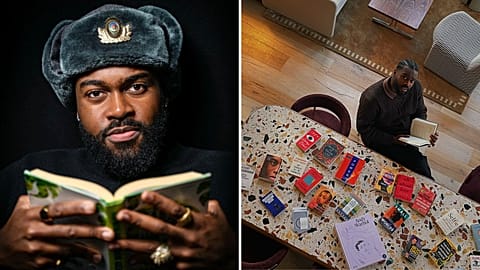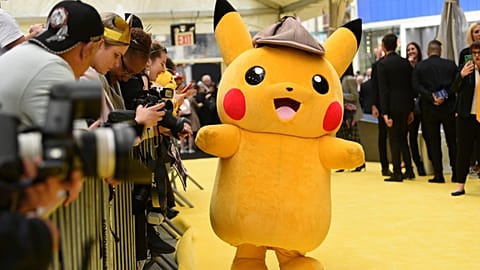#BookTok is one of the most popular trends on TikTok, but how is it changing the way people actually read?
“The end of the world.” It’s the sole caption X user Lazar Radic posted alongside an image of a bookshelf in – seemingly – a Waterstones. It’s not just any bookshelf though, it’s one under a new category: TikTok Chart.
 ADVERTISEMENT
ADVERTISEMENT
 ADVERTISEMENT
ADVERTISEMENT
It’s not an uncommon sight in bookshops everywhere now. New and old releases popular on TikTok are put together to make it easier to find for users of the platform.
As of today, Radic’s post has been viewed more than 35 million times. He might have hoped for such a mass engagement to agree with his doom-saying tone. Perhaps he’s suggesting that social media-driven readers are opting for more vapid material? He didn’t get that response though. The vast majority celebrate the possibility that young readers are engaging with literature.
On TikTok, literature has become one of the biggest topics since 2020. The tag #BookTok has over 200 billion views as content creators upload reviews, skits and other book related content.
Coco Hagi is one of those creators. Growing up in Leicester, England, she’d been a voracious reader her whole life but had never found much representation for herself as a hijab-wearing Muslim in the UK. That changed when Hagi started browsing BookTok during the pandemic. In 2021 she started her own channel Cult of Books.
“I thought, I’m 25,” Hagi explains, “I have these books that I love and I feel like I have an opinion, so why not see what the general public thinks.” Since she started her channel, Cult of Books has amassed more than 77,000 followers and received over 2 million likes. For the most part, Hagi’s videos are her recommending and categorising books she’s read – usually in the romance genre – with the occasional skit thrown in.
On TikTok, Hagi found a community of peers that she felt a kinship with that had been hard to come by in Leicester. “TikTok has opened up representation and made it a lot easier to find young black authors like Talia Hibbert, who I feel in previous generations wouldn’t have gotten as much exposure.”
New reach, new readers
Growing a BookTok community has meant more to Hagi than just finding online friends to recommend books to each other. She credits the platform with introducing her to many of her best friends. “My best friends are in Atlanta, Florida and Chicago,” she says. “A lot of the UK BookTokkers are super close too. Everyone’s so lovely and engaging, we’re always constantly sharing ideas. We have a big group chat and I’ve met most of them in person.”
While Hagi was able to find community, for Ben Mercer, it was also a place to help him in a career-pivot. As a rugby player, he’d played professionally for teams in England, France and Australia, but didn’t feel like he’d conquered the sport. After bowing out, he reflected on his ambitions and wrote ‘Fringes: Life on the Edge of Professional Rugby’ a personal account of a sports career just below the limelight.
He went to TikTok to try and promote the book. In his mid-30s and built… well, built like a rugby player, Mercer is hardly the broad stereotype of a BookTokker, but he took to the platform like a duck to water. Engaging with content creators over a shared love of all books – fiction and non-fiction. He started creating weekly videos where he read short passages from books he loved starting with Sally Rooney’s ‘Normal People’ (a BookTok classic).
Like Hagi, Mercer’s following grew – he’s now got over 200,000 followers – as he continued to post videos of him recommending books and engaging with BookTok trends. “I think people are always looking for new ideas and new ways to reach people,” he says. “All it really is, is a word of mouth amplifier.”
But wasn’t TikTok meant to be “the end of the world”, at least according to that online poster. For many social media sceptics, there’s a fear that the power of influencers are taking over from the important role of critics in guiding the public towards good quality literature.
Mercer is quick to note that he isn’t a critic. “I'd rather just be kind and sharing in a positive manner and leave the critique to somebody else,” he says, noting that as an author himself, while it might be easy to go online and trash a book he didn’t like, he would never want to contribute to a cruel pile-on for a fellow author.
Keeping it real
If those are concerned that BookTok influencers are only in it for clout and will promote any old book that might in turn promote them, Hagi points out the importance of authenticity on the platform. “They will always clock you. If you say you like a book, and people can tell you don’t, they will let you know,” she says. “You have to be very honest to yourself and your niche.”
Both Hagi and Mercer radiate positivity about the platform. It’s not hard to see why. For Mercer, the positive feedback and community he’s grown has spurred him on to write three more books, while Hagi has landed a job as an editorial assistant at the esteemed publishing company Penguin.
Hagi can barely believe her luck, from working on the sales floor of a Waterstones during her studies to starting Cult of Books and now working directly in one of the industry’s stalwarts. “I’ve gotten to talk at Penguin for their Lit in Colour programme,” she notes. “If you are passionate about something, it can truly change the course of your life.”
For booksellers, the value of a social media platform that generates publicity for books is a no-brainer to get involved with, regardless of what an angry X user might think.
“Gen Z is starting to read again after years of it being a ‘boring hobby’,” says Alyssa Badur, Social Media Manager at Dussmann das KulturKaufhaus, one of Germany’s biggest bookshops. “The great thing is that they not only read in English, but also dare to read in foreign languages.”
In recent research from the Publishers Association, 59% of 16-25 year olds say that BookTok has “helped them discover a passion for reading.” Importantly for the physical bookshops, of the 2,000 respondents, nearly half (49%) also said they’ve visited a bookshop in person due to TikTok.
“As Germany's largest media retailer with a wide social media reach, it's important for us to know which books are currently being talked about on TikTok and reviewed by book bloggers,” Badur continues. Popularity on BookTok “often guarantees success on our accounts,” she notes, recalling Rebecca Yarros’s ‘Fourth Wing’ flying off shelves last year.
One criticism levelled at BookTok is that it primarily lifts up fiction that’s of a lesser quality than the works critics rave about. In the image Radic posted, many of the books are in the romance genre – Hagi’s favourite – or the young adult genre. Badur also notes that the books Dussmann sells through TikTok are mostly in the New Adult and Young Adult genres.
Partly, this criticism can be brushed aside as classic snobbery. For far too long romance novels have faced unfair – and often misogynistic – disapproval based purely on its popularity over more ‘literary’ genres.
It’s also not an accurate picture. In just the first row of the image Radic posted, there’s Donna Tartt’s ‘The Secret History’, Jeffrey Eugenides’ ‘The Virgin Suicides’ and Hanya Yanigahara’s ‘A Little Life’. All critical darlings by authors who share two Pulitzer Prizes, four nominations for the National Book Critics Circle Award and a nomination for the Booker Prize between them.
“Modern literature, classics and fantasy also have their place on TikTok,” Badur points out. It’s a point attested to by the winners of last year’s inaugural TikTok BookTok Awards in the UK and Ireland. A shortlist was curated by a panel including authors Candice Braithwaite and Elizabeth Day, as well as influencers like Hagi and Mercer.
For the ceremony in August, Nobel Prize winning author Kazuo Ishiguro was in attendance. “This amazing establishment author was there, and I don’t think anyone’s gonna make him do anything he doesn’t want to do,” Mercer says of Ishiguro. On the night though, Ishiguro went home empty handed. The Revival award did go to another literary establishment name though: Jane Austen.
Another prize was also given out to the year’s best Indie Bookshop. Edinburgh’s Portobello Bookshop, a cute retailer that posts idyllic content recommending books, often taking advantage of their picturesque seaside location.
Kira Scott has run the social media for the Portobello Bookshop since joining in 2021. “As soon as we started posting, we saw the difference in audience and how much more passionate and focused these people were on books and on recommendations,” Scott says.
She also notes that through responding to BookTok interests, they’ve stocked more fantasy, Young Adult, and sci-fi books, genres they “typically wouldn’t have had a lot of stock in.” But instead of this just benefitting TikTok users, they’ve found regulars of all ages responding well. “A lot of customers are saying: ‘This is what we want’, so we’re not only appeasing those on BookTok.”
The main demographic of BookTok does skew towards young women, and the impact on publishers and booksellers is an interesting trend, writes Natalie Wall, an English PhD student at the University of Liverpool, in The Conversation. “Young women have rarely been taken seriously as either critics and readers,” she notes. Though Wall does question the risk of BookTok’s impact homogenising the industry. “BookTok also has a problem with diversity – in more ways than one. Its recommendations are overwhelmingly by white authors, and it is unclear what the long-term effects of this will be on both publishing and the young readers who flock to the app for recommendations.”
From Scott’s perspective at the Portobello Bookshop, she’s noted an increase in people in their late 20s and 30s coming to the shop. “It's not just young folk, even though that's really important. It's nice that it's benefiting everyone, from our perspective, at least.”

















